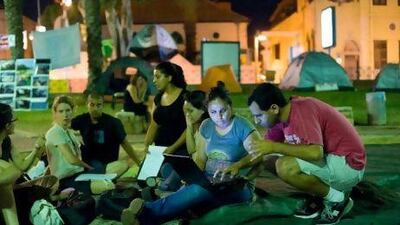JAFFA, ISRAEL // Wfa Abu Shmes and Israel Steinling have found a common cause.
In late July, Ms Abu Shmes, a 37-year-old Palestinian mother of three, pitched a tent in a park in Jaffa on the outskirts of Tel Aviv to inaugurate a housing protest camp. She spends most of her monthly income of 3,500 shekels (Dh3,636) on rent,
Soon after, Mr Steinling, a 58-year-old Jewish father of three, constructed a wooden hut 30 metres away from Ms Abu Shmes's tent, similar to the one he built outside the entrance to the home he was evicted from in June. The demonstration is against the lack of affordable homes in the mixed Jewish-Palestinian town.
The two are united in their anger against a government policy they claim has long been aimed at distancing low-income families - especially Palestinian but also Jewish - from the coastal city by developing luxury homes that have spurred skyrocketing property prices.
They are also demanding the construction of public housing for the more than 200 eligible Palestinian and Jewish families and the cancellation of eviction proceedings for about 700 additional, mostly Palestinian, families.
The camp, now with 17 tents, has become the only joint Jewish-Arab protest site out of at least three dozen that have sprung up in cities across Israel in recent weeks. The camps are part of a cross-country housing demonstration that has become Israel's biggest ever social and economic protest.
The Jaffa camp has drawn little media attention despite its location just several kilometres away from the main protest site on Tel Aviv's luxurious Rothschild Boulevard, which has been a magnet for Israeli and foreign journalists. While the Rothschild camp has become known as a liberal hub for young Jews in their 20s and 30s, the residents of the Jaffa site face a more delicate relationship that relies on a mutual respect for religious and cultural differences.
In consideration of the Muslims who occupy the camp and are observing Ramadan, drinking alcohol and smoking shisha are off-limits, modest dress is observed during Friday's prayer service, and single women are discouraged from staying the night.
The camp remains mostly desolate during the day as its inhabitants meet after sundown to break the daily Ramadan fast.
Then, they feast on a dinner that had been cooked in a makeshift kitchen by Ms Abu Shmes. On a recent evening it was schnitzels, salad and French fries. They greet visitors and sit in a circle on mats or plastic chairs to debate their protest tactics.
Similar to the social website-driven housing protest across the country, the Jaffa camp also organises its activities through its Facebook page, presented in both Hebrew and Arabic.
The camp's dwellers insist that they do not discuss politically sensitive issues. "This is a joint fight. Politics stays out," said Mr Steinling.
As proof of that, the Jaffa encampment has joined forces with another housing protest group in the predominantly low-income Hatikva neighbourhood of Tel Aviv, where many residents are known for being supporters of the ruling right-wing, pro-settler Likud party. While the alliance is fragile because of the political differences, demonstrators say they share a common demand for the building of more affordable housing in their areas.
But for some in Jaffa, politics has long been part of the housing protest. Palestinian residents have long claimed that the Israeli authorities are using ownership disputes and building irregularities to evict them from their homes in order to sell them to developers to build high-end homes. They say the evictions are an attempt at a gradual expulsion of Jaffa's Palestinian population because such luxury homes are mostly bought by wealthy Jews.
While the evictions and high prices in the town of 52,000 residents - including 20,000 mostly poverty-stricken Palestinians - are affecting mostly Palestinians, they are also hurting some of the Jewish residents.
Mr Steinling was evicted from his home of 36 years because his ownership of the apartment had been disputed by a publicly run property company that had previously owned the house.
He has protested the eviction order by moving his family of five into the cloth-covered wooden hut.
He has equipped it with mattresses, hooked up electrical appliances with a cable to an outlet inside his former apartment and is using neighbours' bathrooms and showers.
Mr Steinling said he has nowhere else to go because he is unemployed and cannot afford paying rent with his monthly social benefits.
Ms Abu Shmes is no less dedicated to the housing protest. Her family has changed homes nine times in the past decade because of rent increases, squatted in empty apartments twice and has been waiting for 13 years for public housing for which they are eligible.
"I am not leaving until they give me an affordable home," she said as she stood by her tent, nestled below a large white banner that read: "Jaffa and Hatikva together for public housing. Even after the summer holiday ends and my kids start school, I'll still be here."

